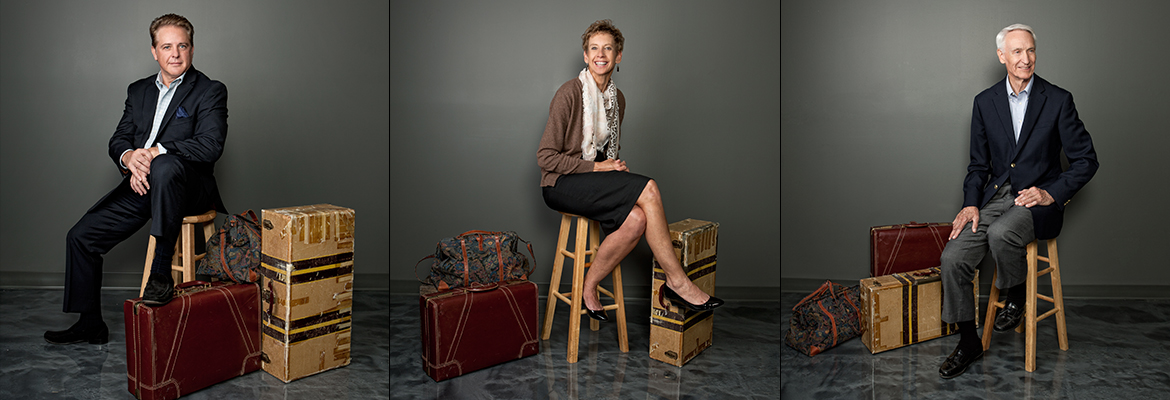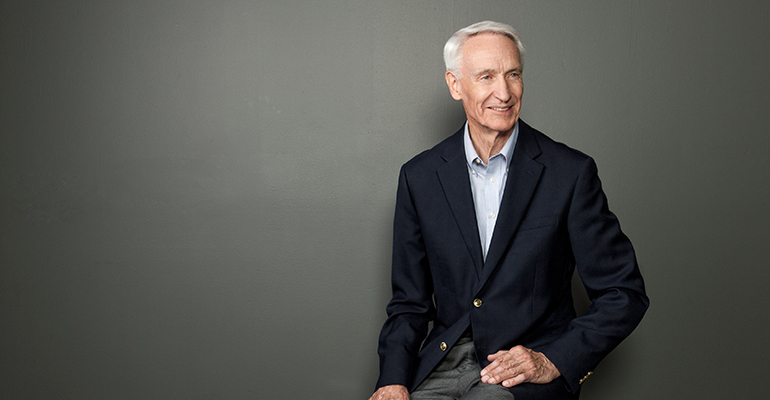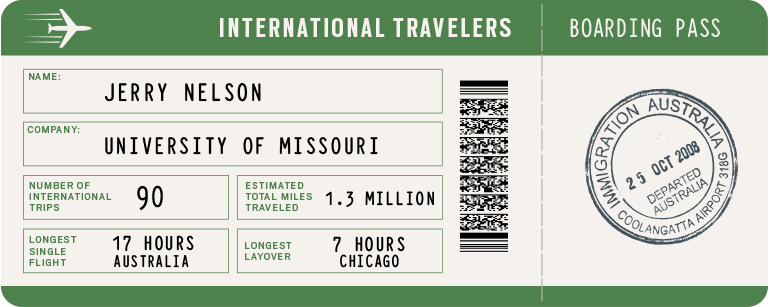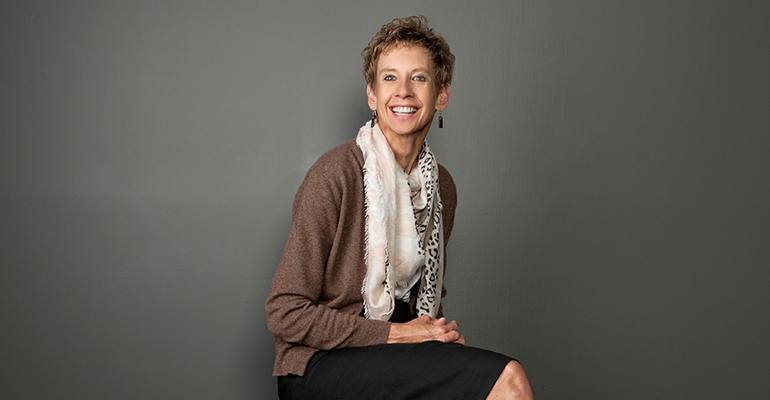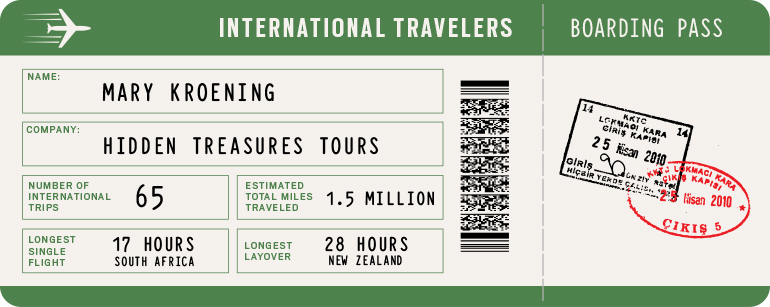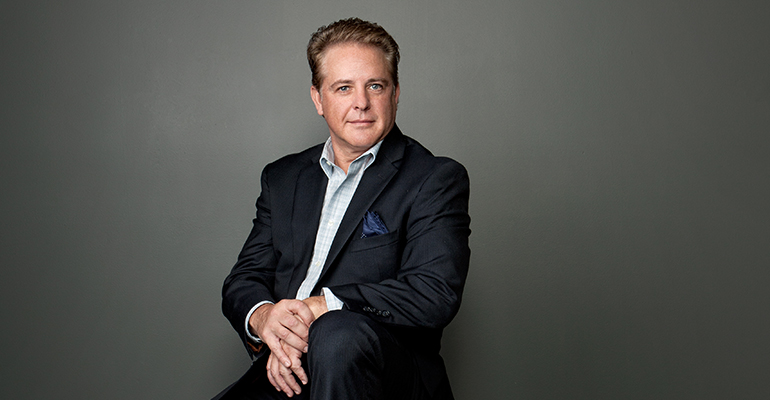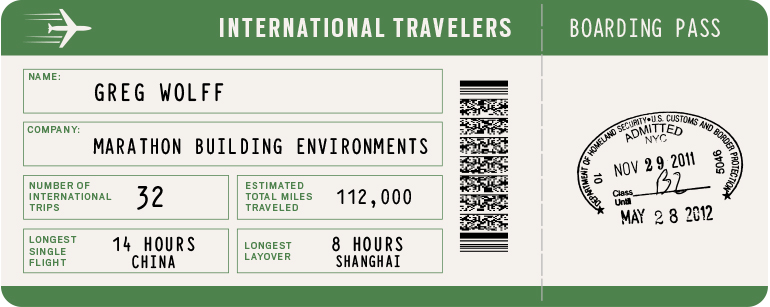Now Departing: Columbia, Missouri
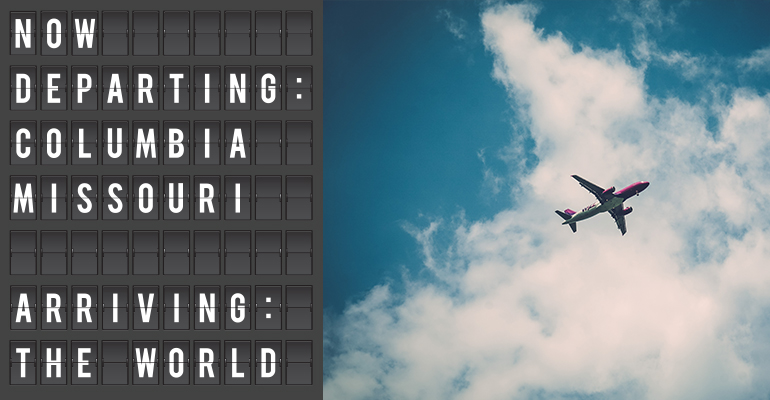
Many Columbia residents fly overseas in the course of doing business. Three Columbians and international travelers recall the miles and flight times to give a peek at what it’s like to take an international journey. The three travelers we feature share an affinity for cultivating — a horticulturalist, a plant scientist and an investor in startups — and for exploring.
Dr. Jerry Nelson knows how to get things in the ground.
He spent 35 years as a faculty member at the MU’s Division of Plant Sciences, and he’s spent the first 13 years of retirement lending his expertise to help Asia and Africa with their agricultural challenges. Currently, he’s trying to solve disputes about water with several countries in Indochina.
Nelson also knows about getting off the ground — flying over oceans 90 times in the past four decades.
The travel bug first bit Nelson in the early ’70s, when MU granted him a sabbatical leave to Wales. He and his wife Barbara hopped on a plane with their two small children and lived a year in the country. The initial experience overseas had a long-term impact on him. “I gained insight into the power of language and of the subculture in Great Britain,” he says. Some political elements in Wales have long wanted to secede from the U.K. and become a sovereign state. Nelson says the country holds a strong affinity toward the Welsh language and its uniqueness.
Time spent in Wales also opened Nelson’s eyes to the way Europeans approach academic disciplines. “Their scientists tend to be more visionary than scientists in the U.S., but we’re more effective in the application of that vision,” he says.
The bulk of Nelson’s overseas trips have been in conjunction with MU’s working relationship with Asian countries, namely South Korea, China and Vietnam. He has flown to South Korea 39 times, working to increase student engagement at half a dozen universities, and he helped start the first joint Ph.D. program in Plant Sciences with Gyeongsang National University.
North Korea is a different experience altogether. Nelson has assisted with science exchange in agriculture there to help spur food production and diplomatic relations. His visits to the nation’s countryside have had a personal impact as well. “The children are so happy, with so much potential, but they won’t achieve much,” Nelson says. “How many Nobel Peace Prize winners, how many world-class violinists are we missing out on simply because they don’t have the opportunities that kids in the United States have? While our culture says ‘Give us,’ they say ‘allow us.’”
Flying has put Nelson in some tight spots. Literally. He stands almost 6 feet 7 inches tall. “It’s not easy fitting in seats,” he says. “That’s why I almost always get an exit row.”
With that many flights, one would think there’d be some scary moments: turbulence, mechanical failures, medical emergencies, etc. Not for Nelson. “I don’t think I’ve even had one missed bag — I’ve been very fortunate.”
One flight, though, did test Nelson’s endurance – the kind of patience the veteran agronomist may have found by watching a lot of grass grow. On a return trip from Europe, a mother from France had a 2-year-old child who screamed the entire flight. “I tried to hold him and help him, and so did the flight attendants, but nothing worked.”
Two weeks later, Nelson received a $200 check in the mail from the airline. “They were embarrassed and thanked me for putting up with the frustration.”
Nelson passes his time on his flights, often 12 hours long, by reading research, at least on the way over. On the way back, he likes to read newspapers. “I’ve got to catch up on the news,” he says, “because when I’m overseas, I don’t know what’s going on in the United States.”
He’s also learned to sleep away half the trip to get a jumpstart on jet lag when he lands. He’s never taken sleeping pills. “For some reason, when the plane is about to take off, I start to yawn,” Nelson says.
Nelson is considering flying out again to southeast Asia, where he will use his knowledge about agriculture to solve a multi-country spat.
The Mekong River runs through Vietnam, Cambodia, Laos and Thailand. The water flow near the basin, in Vietnam, has slowed due to heavy usage upriver. In addition, the tide from the South China Sea backs up into the river, causing area soils to be salty, therefore hurting the growth of rice, the region’s major food crop. Nelson will assist in the creation of a museum in Vietnam about the river. “We want to raise awareness and help them partition the water supply to help everyone,” he says. It will be his second museum in Asia, the first, called Seeds for Life, is in South Korea.
Shortly after Nelson retired, Barbara passed away. They had been active with the Korean Student Association, which subsequently created an endowed assistantship that annually covers a year of graduate school. Students coming from Korea to MU may now be eligible for the Dr. Jerry and Barbara Nelson MU-Korea Ag Alumni Scholarship.
With more than a million miles of international travel, Nelson has established a visible and important footprint in the world, and he’s helped internationally brand MU in the process.
Mary Kroening goes out of her way to show friends new things, even if that means crossing the Pacific or Atlantic Ocean several times a year.
The former master gardener at MU Extension runs Hidden Treasures Tours, specializing in garden expeditions in non-touristy corners of the world. She typically takes eight to 12 people on one to two week trips in places like England, New Zealand, Australia, Costa Rica, Italy and Chile.
“I try to take my groups off the tourist paths and get into the heartbeat and culture of the country we’re visiting,” Kroening says.
She makes arrangements with boutique travel companies and secures a private guide and private vehicles. “Not having to be hauled around in a large bus is a great attraction.”
She adds an extra touch of customer service by sharing her knowledge of the region’s flora. Kroening can rattle off areas in the world that have soil, climate and conditions ideal for the best vineyards, coffee and varieties of plants.
Kroening started her business about 15 years ago, when she began offering horticulture study tours to Costa Rica and coordinating custom itineraries for master gardener groups. The clientele has since expanded to bird watchers, wine enthusiasts, natural history buffs and even golfers.
Kroening is a seasoned traveler, having made about 65 international trips accounting for roughly 1.5 million miles in the air. The overwhelming majority of trips have been trouble-free.
“Out of hundreds of clients, no one in our groups has ever been sick or injured,” Kroening says. “We had one exception, where we had to find a dentist for a client with a broken tooth.”
February 2011 stands out for Kroening and members of her tour en route to Christchurch, New Zealand. “A massive earthquake hit the country while we were in the air,” she says. “People were fleeing the city. It was a very odd time to be in a country in crisis.”
Far-off cultures have impacted Kroening the same way they impact other international travelers. Their experiences fly parallel; broad travels lead to broad-mindedness, it seems.
“I’m calmer and more relaxed now about taking things in stride,” Kroening says. “In the U.S., we can tend to be narrow-minded. We don’t understand that other cultures have existed hundreds of years before we were here.”
Kroening has some advice for country-hopping newbies. “Be patient, relaxed and comfortable,” she says. “You’ll wait in long security lines, so just know that ahead of time.” She also tells her groups how to avoid jet lag. She advises they burn as much energy as they can before boarding the plane so they’ll sleep better in the air. “I don’t advise anyone to take a nap when they get to their destination,” she says. “If you do, you’ll be screwed because you won’t be able to go to sleep that night.”
Kroening finds it relatively easy to doze away the hours on a plane. When she’s awake, she enjoys in-flight movies or watches downloaded movies on her iPad. Her longest flight, about 17 hours, was from Atlanta to Johannesburg, South Africa, which ranks among the top 10 longest flights in the world.
Kroening’s 2016 tours include Costa Rica in February; Cotswolds, England and Wales in May; and Romania in June. She is most excited about the Romania trip. It’s something she’s never done before —an all-castle tour. Her group will explore Bucharest and Transylvanian castles for 10 days.
While ushering people all over the globe has been a satisfying hobby, Kroening does have a personal wish. If you ask where else she would like to go in the world, she’ll answer before you have a chance to finish the question: “Alaska!” As she describes the beauty and rich landscapes of the Last Frontier, one can imagine a domestic tour in the making. And given her track record, if she makes a path for it, many will likely follow.
Greg Wolff isn’t afraid of diving into things.
As a scuba enthusiast, he’s explored ocean depths off the coast of Honduras, Mexico, Costa Rica and the Dominican Republic.
As an entrepreneur, he’s waded into the waters of business ownership and startup investing. He is founder and co-owner of Marathon Building Environments, a local company specializing in office interior design, furniture, flooring and window treatments.
“I’ve been blessed with a lot of energy,” he says, watching his 2-year-old son scamper across their living room. That kind of energy has enabled him to pursue business opportunities in China about half a dozen times in the past four years.
His travels began in earnest after meeting Ryan Tang, founder and chief international officer of adFreeq, an online advertising platform for businesses. Conversations about Tang’s work piqued Wolff’s interest in taking a few American brands to China.
Flying long distance can become routine, but it’s also an adventure that suits Wolff’s personality. New cultures and new opportunities abound. When he stepped off the plane in Shanghai for the first time, he got an initial taste of what it’s like to be part of a smaller group in the population. “You don’t see many Caucasians, or even U.S. minorities, there,” he says.
One lasting memory occurred after landing in China and getting deeper into the country, where not everyone has access to a pickup truck or trailer. “I saw a guy lower a small refrigerator onto the back of his moped,” Wolff says. “He was taking it home and just did what was needed to move it.”
Flying internationally has since become routine for Wolff, but there were a lot of lessons along the way. For one, in addition to securing the right visas and shots, he recommends first-time flyers bring a change of comfortable clothes and stock up on essential toiletries. The 7,000-mile journey from Chicago to Shanghai takes about 14 hours, even with a direct flight. “At first, the time change was a big shock,” Wolff says. “Getting prescriptions to help sleep was a big help.”
International flights include several amenities to make trips more endurable; of course, they come with a corresponding price tag. After first class and economy, many long flights include business class seating, which is similar to domestic first class. Some provide seats in which you can lie completely flat. Entertainment systems, food choices and other comforts can run the gamut.
Wolff can’t share those experiences — not because he won’t, but because he hasn’t had them. “I usually am back with the cattle in economy,” he jokes. “I have a high tolerance for pain and am a pretty frugal guy, so it doesn’t bother me that much.”
Wolff knows a good deal when he sees one. He says he can typically book a round-trip flight to China for under $1,500. Typically, his airline of choice for international trips is American, because of their array of options in Chicago and Shanghai.
Wolff gives another piece of advice to those considering international flights: Alert your cell phone carrier to arrange for an international data plan, and make sure you can get Internet. “If you go to a Starbucks there, you’re probably okay, but if you go to a general space, you won’t know what the heck the Chinese characters are on your phone.”
While the early startups in China didn’t go as planned — a nasal wash, to help offset the country’s pollution woes, and a yogurt franchise — nothing has deterred Wolff from continuing his travels back and forth between Asia. If a trip doesn’t strike gold, he keeps digging, and he sometimes finds it outside of business. His most successful international trip occurred on one of his early flights to China. He met a broadcast journalist, Wei, whom he has since married.
Wolff has also traveled with Dr. Rob Weagley, chairman of MU’s Department of Personal Financial Planning. Weagley scheduled Wolff to lecture to students at Renmin University, in Beijing, on the topic of business and life in America. Wolff enjoyed the experience — he could impart some of his learnings to young people with a passion for business. “Being bold and aggressive and using resources can get you a long way,” he told the class.
Indeed it can. It’s gotten Wolff around the world and into a class of highly successful businesses in mid-Missouri.



